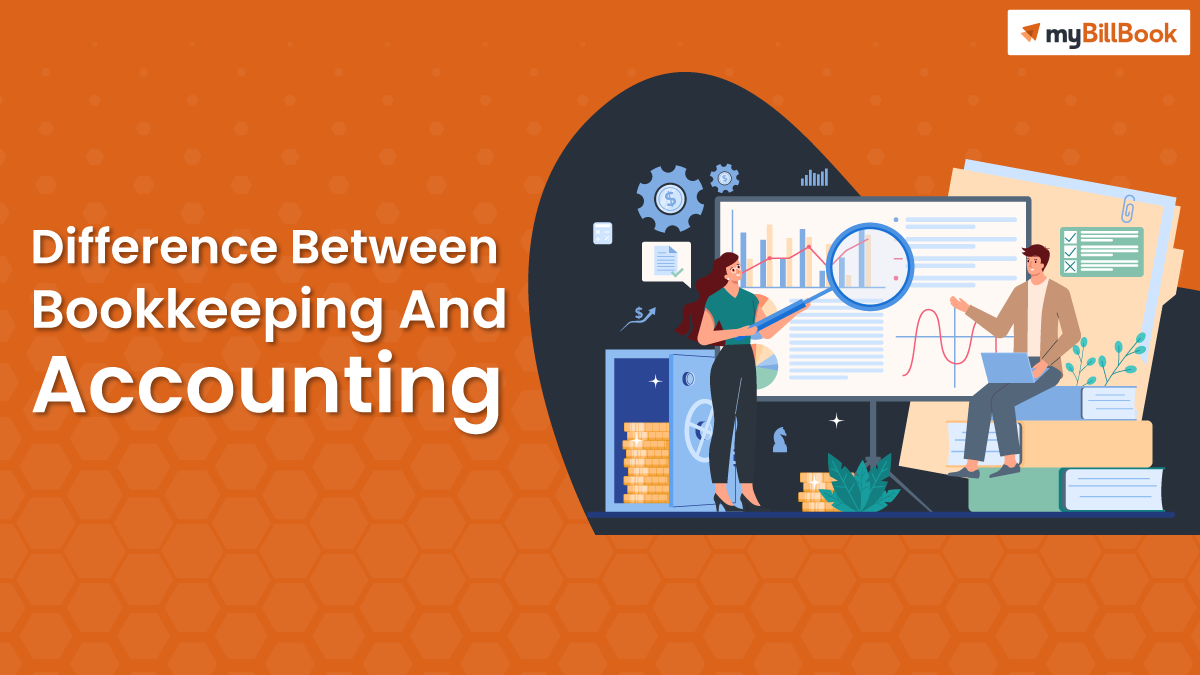Major Bookkeeping & Accounting Differences
The functions of bookkeeping and accounting are distinct, mainly because they are performed by different groups of people. Generally, a company’s bookkeeping and accounting tasks are divided into two parts: The Bookkeeping Department is responsible for the day-to-day recording requirement and data entry task whereas the Accounting department is primarily responsible for interpreting, classifying, analysing, reporting, and summarizing.
The field of accounting focuses on providing information that is necessary for the management of a business. Bookkeepers are experts in processing financial data and generating reports based on the daily transactions of a business. While the job description of bookkeeper and accounting professional might sound similar, both these jobs require a considerable amount of knowledge and understanding of the business and its general ledger. Since both roles deal with monetary transactions, it is not uncommon for a small business to assign the work of bookkeeping to an accountant and vice versa. However, other factors should be considered before making such an assumption.
Importance of Bookkeeping
If a company doesn’t keep correct and thorough records, it could lose its business license. From an accounting standpoint, turnover issues and financial reliability are just two of the things at stake when proper bookkeeping systems aren’t in place. Bookkeeping and accounting experts agree that a business must have the correct infrastructure to operate smoothly and accurately. The most successful small companies have clear processes for how the books are kept, including checks and balances to ensure accurate results. Bookkeeping helps businesses in the following ways.
1) Bookkeeping for tax evaluations
While bookkeeping can, for many, be a tiresome task to be completed at the end of every month, it is vital for both you and your business. Without proper bookkeeping, it is almost impossible to file an accurate tax return. Bookkeeping is a task that many small business owners try to avoid out of fear of making mistakes, but they are doing their businesses a disservice by not having complete records. Businesses use bookkeeping to keep track of the income and expenses of the firm, for the business to maintain financial records. Additionally, bookkeeping provides information about how the business is performing, and this can be used to make operational decisions.
2) For legal purposes
It is not enough for a business to simply submit VAT returns and tax returns. They must also maintain records of business transactions so that audits are possible at any point in time. It is thus important to ensure that all records are kept up-to-date, with every transaction recorded so that no discrepancies arise between the amount reported previously on tax or VAT returns. If the agency finds any inconsistencies, it will pursue your business for penalties.
3) For using analysis for informed decision making
Bookkeeping is the practice of recording business transactions and making sense of the data by categorising it. By ensuring your accounts are up to date, you will be able to easily analyse how your business is performing, which will help you make better decisions in future.
4) For formulating business strategies
Bookkeeping will provide a wealth of financial information about your business, which will be used to develop a strategy for the future of the business. It follows that bookkeeping is an integral part of business strategy. If a business is not profitable the bookkeeper guides the business into a position where they are making a profit, keeping track of stock and analysing all financial transactions for any anomalies.
Accounting: Explained
Accounting is to track the flow of money in commercial business and government institutions. Accounting is the process of summarizing, interpreting, and communicating financial transactions while classifying them into ledger accounts. The purpose of accounting is to provide information to various stakeholders about the financial position of a company or organization.
The duties of accounting include:
* Analysing accounts and business models to ensure seamless continuity of business
*Auditing financial information
* Having a firm grasp on the income and the expenses while managing payroll.
*Looking into insolvency cases
*Heading the tax planning efforts of an organisation
*Acting as a liaison of the organisation while finalizing deals with partners and clients from a finance standpoint
The major differences between Bookkeeping and Accounting
| Serial | BookKeeping | Accounting |
|---|---|---|
| 1 | Bookkeeping acts as a ledger that identifies and store financial information of the organisation | Accounting refers to the process of summarising, interpreting and communicating the financial data of an organisation. |
| 2 | Organisations cannot solely depend on the data curated from Bookkeeping to make business decisions | Organisations can rely on the data derived from accounting |
| 3 | Generating financial statements is not the core task of bookkeeping | Financial statement is an important part of Accounting |
| 4 | Bookkeeping does not provide analytical insights to the organisation | Accounting is responsible to enable the business to make informed decisions with their analysis and research |
| 5 | The person who works for this role is generally called a 'bookkeeper' | The person who works on the accounting side is called an accountant |
| 6 | Bookkeeping alone cannot help in broadcasting the financial situation of the company | Accounting can show the current financial position and also project the future probabilities based on analysis and research |
| 7 | Bookkeeping does not require intensive training | Accounting requires professionals who are experts in the industry and have the skillset and prior knowledge to fulfil the role |
How are Bookkeeping and accounting moving away from their traditional image with changing time:
The field of bookkeeping and accounting has always been thriving with changes in the way the operations are carried out. Some of the innovations in these fields include the introduction and advancement of computers, the internet, easy access to data and information regarding the business, and cloud technology. All these have enabled businesses to effectively organize their data, make analysis more accessible as well as reduce their chances of risk or loss.
Also read about:
Many trends impact the world of accounting and bookkeeping. The top five shifts are:
1) The merger of Bookkeeping and Accounting
In the current scenario, the line between accounting and bookkeeping is slowly diminishing. It is interesting to note that with the advent of accounting and bookkeeping software, some parts of accounting are being slowly absorbed into the bookkeeping process. This can be seen as a positive development as it ensures accuracy in collecting information from different sources and generating required reports for effective decision making.
2)Technology to make Bookkeeping obsolete
I would not say that bookkeeping will become obsolete, but rather the tasks involved in it will. What used to require human eyeballs and fine motor skills can now be done by computers. It is simple stuff like data entry, balancing bank ledgers, and reconciling bank statements that can be easily automated. I would even expect that a large percentage of small businesses will be doing their accounting in spreadsheet format — maybe even some more advanced stuff using business intelligence tools.
3) Inclusion of Smartphones
This is a trend that has been on the rise, and many businesses are doing it. The point is to make sure the right data and reports can be accessed anytime, from anywhere by clients who want it. This has impacts in managing business accounts as well as filing taxes and preparing financial statements. As a result, accounting and bookkeeping companies are making sure they have robust IT systems in place to help support the transition into the digital world.
Our custom solutions in bookkeeping and accounting are devised to make the process seamless for organisations of all sizes. Our Omnichannel accessibility of resources in real-time makes it seamless for organisations to access integral data at the click of a button. Reach our experts today to discuss how your business can benefit from MyBillBook.








